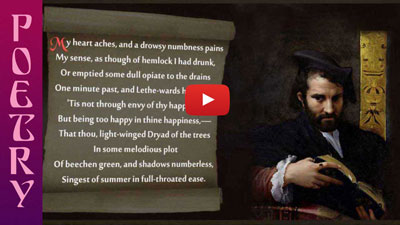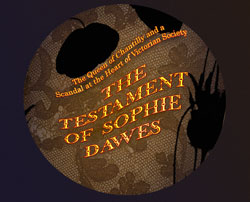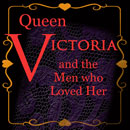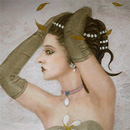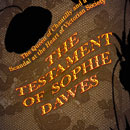Classic English verse from the year 1819
Ode to a Nightingale - Transcript
My heart aches, and a drowsy numbness pains
My sense, as though of hemlock I had drunk,
Or emptied some dull opiate to the drains
One minute past, and Lethe-wards had sunk:
'Tis not through envy of thy happy lot,
But being too happy in thine happiness,—
That thou, light-winged Dryad of the trees
In some melodious plot
Of beechen green, and shadows numberless,
Singest of summer in full-throated ease.
O, for a draught of vintage! that hath been
Cool'd a long age in the deep-delved earth,
Tasting of Flora and the country green,
Dance, and Provençal song, and sunburnt mirth!
O for a beaker full of the warm South,
Full of the true, the blushful Hippocrene,
With beaded bubbles winking at the brim,
And purple-stained mouth;
That I might drink, and leave the world unseen,
And with thee fade away into the forest dim:
Fade far away, dissolve, and quite forget
What thou among the leaves hast never known,
The weariness, the fever, and the fret
Here, where men sit and hear each other groan;
Where palsy shakes a few, sad, last gray hairs,
Where youth grows pale, and spectre-thin, and dies;
Where but to think is to be full of sorrow
And leaden-eyed despairs,
Where Beauty cannot keep her lustrous eyes,
Or new Love pine at them beyond to-morrow.
Away! away! for I will fly to thee,
Not charioted by Bacchus and his pards,
But on the viewless wings of Poesy,
Though the dull brain perplexes and retards:
Already with thee! tender is the night,
And haply the Queen-Moon is on her throne,
Cluster'd around by all her starry Fays;
But here there is no light,
Save what from heaven is with the breezes blown
Through verdurous glooms and winding mossy ways.
I cannot see what flowers are at my feet,
Nor what soft incense hangs upon the boughs,
But, in embalmed darkness, guess each sweet
Wherewith the seasonable month endows
The grass, the thicket, and the fruit-tree wild;
White hawthorn, and the pastoral eglantine;
Fast fading violets cover'd up in leaves;
And mid-May's eldest child,
The coming musk-rose, full of dewy wine,
The murmurous haunt of flies on summer eves.
Darkling I listen; and, for many a time
I have been half in love with easeful Death,
Call'd him soft names in many a mused rhyme,
To take into the air my quiet breath;
Now more than ever seems it rich to die,
To cease upon the midnight with no pain,
While thou art pouring forth thy soul abroad
In such an ecstasy!
Still wouldst thou sing, and I have ears in vain—
To thy high requiem become a sod.
Thou wast not born for death, immortal Bird!
No hungry generations tread thee down;
The voice I hear this passing night was heard
In ancient days by emperor and clown:
Perhaps the self-same song that found a path
Through the sad heart of Ruth, when, sick for home,
She stood in tears amid the alien corn;
The same that oft-times hath
Charm'd magic casements, opening on the foam
Of perilous seas, in faery lands forlorn.
Forlorn! the very word is like a bell
To toll me back from thee to my sole self!
Adieu! the fancy cannot cheat so well
As she is fam'd to do, deceiving elf.
Adieu! adieu! thy plaintive anthem fades
Past the near meadows, over the still stream,
Up the hill-side; and now 'tis buried deep
In the next valley-glades:
Was it a vision, or a waking dream?
Fled is that music: - Do I wake or sleep?
My sense, as though of hemlock I had drunk,
Or emptied some dull opiate to the drains
One minute past, and Lethe-wards had sunk:
'Tis not through envy of thy happy lot,
But being too happy in thine happiness,—
That thou, light-winged Dryad of the trees
In some melodious plot
Of beechen green, and shadows numberless,
Singest of summer in full-throated ease.
O, for a draught of vintage! that hath been
Cool'd a long age in the deep-delved earth,
Tasting of Flora and the country green,
Dance, and Provençal song, and sunburnt mirth!
O for a beaker full of the warm South,
Full of the true, the blushful Hippocrene,
With beaded bubbles winking at the brim,
And purple-stained mouth;
That I might drink, and leave the world unseen,
And with thee fade away into the forest dim:
Fade far away, dissolve, and quite forget
What thou among the leaves hast never known,
The weariness, the fever, and the fret
Here, where men sit and hear each other groan;
Where palsy shakes a few, sad, last gray hairs,
Where youth grows pale, and spectre-thin, and dies;
Where but to think is to be full of sorrow
And leaden-eyed despairs,
Where Beauty cannot keep her lustrous eyes,
Or new Love pine at them beyond to-morrow.
Away! away! for I will fly to thee,
Not charioted by Bacchus and his pards,
But on the viewless wings of Poesy,
Though the dull brain perplexes and retards:
Already with thee! tender is the night,
And haply the Queen-Moon is on her throne,
Cluster'd around by all her starry Fays;
But here there is no light,
Save what from heaven is with the breezes blown
Through verdurous glooms and winding mossy ways.
I cannot see what flowers are at my feet,
Nor what soft incense hangs upon the boughs,
But, in embalmed darkness, guess each sweet
Wherewith the seasonable month endows
The grass, the thicket, and the fruit-tree wild;
White hawthorn, and the pastoral eglantine;
Fast fading violets cover'd up in leaves;
And mid-May's eldest child,
The coming musk-rose, full of dewy wine,
The murmurous haunt of flies on summer eves.
Darkling I listen; and, for many a time
I have been half in love with easeful Death,
Call'd him soft names in many a mused rhyme,
To take into the air my quiet breath;
Now more than ever seems it rich to die,
To cease upon the midnight with no pain,
While thou art pouring forth thy soul abroad
In such an ecstasy!
Still wouldst thou sing, and I have ears in vain—
To thy high requiem become a sod.
Thou wast not born for death, immortal Bird!
No hungry generations tread thee down;
The voice I hear this passing night was heard
In ancient days by emperor and clown:
Perhaps the self-same song that found a path
Through the sad heart of Ruth, when, sick for home,
She stood in tears amid the alien corn;
The same that oft-times hath
Charm'd magic casements, opening on the foam
Of perilous seas, in faery lands forlorn.
Forlorn! the very word is like a bell
To toll me back from thee to my sole self!
Adieu! the fancy cannot cheat so well
As she is fam'd to do, deceiving elf.
Adieu! adieu! thy plaintive anthem fades
Past the near meadows, over the still stream,
Up the hill-side; and now 'tis buried deep
In the next valley-glades:
Was it a vision, or a waking dream?
Fled is that music: - Do I wake or sleep?
Insights, themes and ideas for interpretation
● Ode to a Nightingale is one of the most celebrated of Romantic-era poems. A blend of beauty and intensity, it is also full of surprises.
● An educated young Englishman of the Regency period is listening to the song of a nightingale, a bird which, unusually, sings at night. But the poet’s thoughts are not entirely happy ones, since the song is so beautiful and haunting that it places his own mortality into focus and leads to a range of ideas and questions about the nature of reality itself.
● At the beginning, the narrator admits to feeling disoriented, his heart aching, as if he is intoxicated in some sense and rendered forgetful (Lethe is a river in mythology whose waters wipe away memories). There is also the experience of being amazed by the bird’s unselfconscious ease of song - something that both disturbs him and yet fills him full of wonder.
● The intoxicants of wine are longed for as an equivalent, a means of perpetuating the sensation, and that he might then be able to fade away into the forest and join the bird, at least in spirit. By this means, the poet might also be able to escape the unpleasant ‘fever and fret’ of the world in which he currently finds himself. One of the theories of where exactly Keats composed the poem is that it was at the Spaniards Inn near Hampstead Heath – then on the outskirts of London. One can perhaps picture the poet on a May evening in the garden of the inn, contrasting the banal chatter around him with the magical song of a far-away nightingale.
● Eventually, the narrator resolves, instead of intoxication, to fly to the Nightingale by using his imagination. Here, in the darkness that he shares with the singing bird, he envisages all the various flowers and blossoms that surround him. It is here that he is overwhelmed with a sense of bliss and feels it would be quite acceptable to die. The nightingale will not die, however. It will sing on – not just the individual bird, but the voice of the nightingale that has already existed through time and will continue eternally.
● It is with this comparison of the brief, mundane life of the poet with the eternal splendour and beauty of the nightingale’s music that the essence of the poem is reached. The reality of the eternal song is surely superior to anything he can draw upon personally or intellectually. A moment of surrender and humility which is both satisfying and rewarding - since the narrator has simultaneously also united his thoughts with a higher, more eternal aspect of himself.
● But the writer’s moment of enlightenment cannot last - nor his own flight of fancy. Eventually the bird flies off and the ‘anthem fades.’ The young gentleman is left to ask himself whether he has emerged from some kind of hallucinatory experience (a vision or a waking dream) and if so, does he thereby return to the comfort of reality? Perhaps. Or does the vanishing of the bird indicate a return to the ‘sleep’ that is perhaps reality itself when compared to the eternal beauty of the nightingale and its song?
● There is much to ponder in this truly magical piece of classic English verse.
● An educated young Englishman of the Regency period is listening to the song of a nightingale, a bird which, unusually, sings at night. But the poet’s thoughts are not entirely happy ones, since the song is so beautiful and haunting that it places his own mortality into focus and leads to a range of ideas and questions about the nature of reality itself.
● At the beginning, the narrator admits to feeling disoriented, his heart aching, as if he is intoxicated in some sense and rendered forgetful (Lethe is a river in mythology whose waters wipe away memories). There is also the experience of being amazed by the bird’s unselfconscious ease of song - something that both disturbs him and yet fills him full of wonder.
● The intoxicants of wine are longed for as an equivalent, a means of perpetuating the sensation, and that he might then be able to fade away into the forest and join the bird, at least in spirit. By this means, the poet might also be able to escape the unpleasant ‘fever and fret’ of the world in which he currently finds himself. One of the theories of where exactly Keats composed the poem is that it was at the Spaniards Inn near Hampstead Heath – then on the outskirts of London. One can perhaps picture the poet on a May evening in the garden of the inn, contrasting the banal chatter around him with the magical song of a far-away nightingale.
● Eventually, the narrator resolves, instead of intoxication, to fly to the Nightingale by using his imagination. Here, in the darkness that he shares with the singing bird, he envisages all the various flowers and blossoms that surround him. It is here that he is overwhelmed with a sense of bliss and feels it would be quite acceptable to die. The nightingale will not die, however. It will sing on – not just the individual bird, but the voice of the nightingale that has already existed through time and will continue eternally.
● It is with this comparison of the brief, mundane life of the poet with the eternal splendour and beauty of the nightingale’s music that the essence of the poem is reached. The reality of the eternal song is surely superior to anything he can draw upon personally or intellectually. A moment of surrender and humility which is both satisfying and rewarding - since the narrator has simultaneously also united his thoughts with a higher, more eternal aspect of himself.
● But the writer’s moment of enlightenment cannot last - nor his own flight of fancy. Eventually the bird flies off and the ‘anthem fades.’ The young gentleman is left to ask himself whether he has emerged from some kind of hallucinatory experience (a vision or a waking dream) and if so, does he thereby return to the comfort of reality? Perhaps. Or does the vanishing of the bird indicate a return to the ‘sleep’ that is perhaps reality itself when compared to the eternal beauty of the nightingale and its song?
● There is much to ponder in this truly magical piece of classic English verse.
Technical info’
Type of Poem =
an Ode: verse that is usually written in praise of something of someone. Here there is 8 stanzas in all of 10 lines each.Rhyme Scheme =
AB AB CDE CDEMeter =
mostly iambic pentameter, but with the 8th line of each stanza in trimeter.Fictional Memoir
Georgian novel
Neo-Victorian
Victorian Gothic

